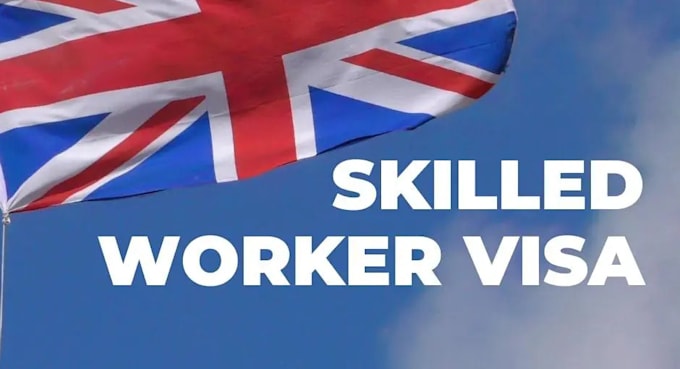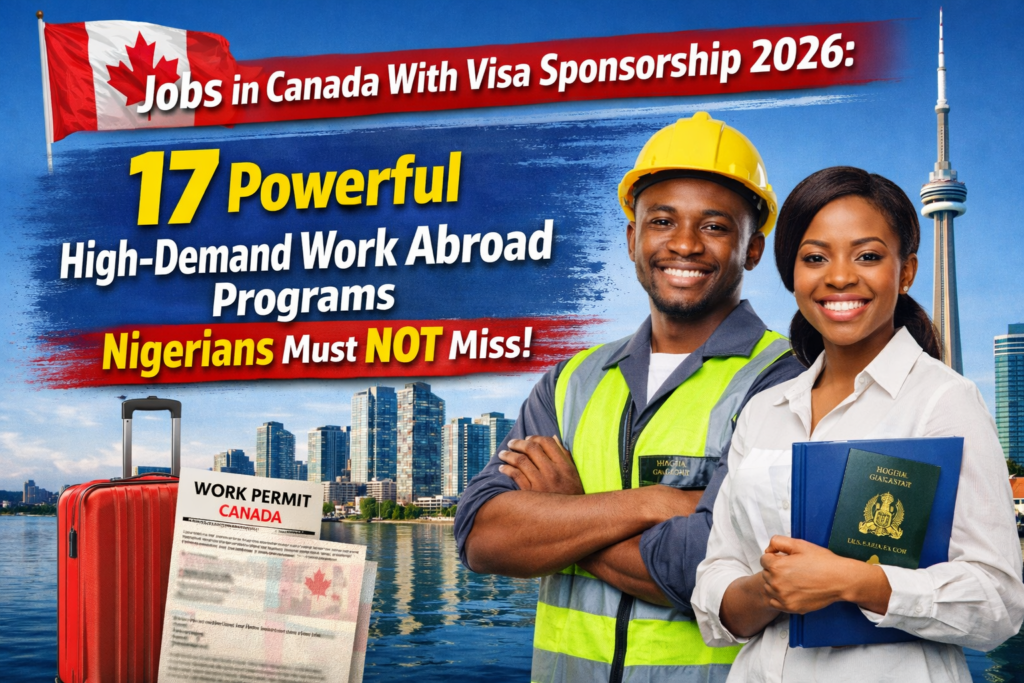Introduction
Shortcut👇.
If you’re an international professional dreaming of working in the UK, you’ve likely been eyeing UK visa sponsorship jobs — roles that come with an employer willing to sponsor your visa. With major changes coming into effect for 2026–2027, now is the moment to act. The pathway to a Skilled Worker visa UK — often referred to as the go-to UK work visa for international talent — is evolving rapidly. This guide reveals 15 powerful secrets you need to know to secure employer-sponsored roles, beat rising competition, and avoid common pitfalls.
Let’s walk through what’s changed, what’s trending, and what you can do to stand out. By the end of this post, you’ll understand how to break into sponsorship jobs UK, where to look, and how to convince companies to pick you — all backed by the latest 2025/2026 changes and insider know-how.

Secret 1: Understand the New 2025–2026 Visa Landscape
The first secret is simply to know what’s changed. On 22 July 2025, the UK implemented significant reforms to the Skilled Worker visa. These reforms tighten the eligibility criteria, raise salary thresholds, and restrict which roles can be sponsored. (DavidsonMorris)
- The skill level requirement is back at RQF 6, meaning only degree-level (or equivalent) roles generally qualify. (DavidsonMorris)
- The minimum salary for new Skilled Worker visa roles jumped to £41,700/year, up from £38,700. (DavidsonMorris)
- Certain lower-skill jobs (RQF 3–5) are only eligible if they appear on a Temporary Shortage List (TSL) or an Immigration Salary List (ISL) — but these lists are temporary. (DavidsonMorris)
- Also, care worker routes (codes 6135 & 6136) for new overseas applicants are being closed. (DavidsonMorris)
Why this matters: if you are targeting UK visa sponsorship jobs for foreigners 2026, knowing these changes is non-negotiable. Many roles that used to be eligible are no longer, and you must ensure that the job you aim for aligns with current rules.
Secret 2: Target the Right Jobs — High-Demand, Eligible Roles
Not all roles are equal when it comes to visa sponsorship. Because of the higher skill bar (RQF 6) and temporary list constraints, you want to focus on high-demand UK jobs with visa sponsorship for international applicants. Here are some sectors to watch:
- Tech & Engineering: Software engineers, data scientists, DevOps, cloud engineers.
- Healthcare (Graduate-level): Qualified nurses, medical radiographers, specialist professionals.
- Professional Services: Consultants, analysts, financial services, accounting.
- Science & Research: PhD-level researchers, lab scientists.
- Senior Business Roles: Managers, directors, corporate specialists.
Companies in these fields are likelier to offer Skilled Worker visa UK sponsorship for 2026, because they meet the stricter RQF and salary requirements.
Secret 3: Know Which Companies Sponsor Visas — and How to Find Them
Getting a job that pays enough is only part of the battle. You must also apply to employers that have a sponsor licence and are actively sponsoring.
Here are ways to find them:
- Use the UK Government’s Sponsor List — The Home Office publishes a list of companies that hold a sponsor licence.
- LinkedIn & Indeed Filters — Use search strings like “visa sponsorship UK” or “Skilled Worker visa supportive company.”
- Specialized Tools — Some individuals have built tools to check if a company sponsors visas (for example, browser extensions that check LinkedIn or job boards for sponsor-licensed employers). > One Reddit user shared:
“I built a tool … to see instantly … whether a company has a sponsorship license.” (Reddit)
- Networking & Alumni — Reach out to people who are already on a Skilled Worker visa. Ask about their employers, how sponsorship was handled, and how they pitched themselves.
By applying strategically, you greatly increase your chances of landing sponsorship jobs UK rather than wasting time on roles where sponsorship isn’t available.
Secret 4: Customize Your Application to Meet Sponsorship Criteria
Once you’ve identified potential employers, tailor your application so you’re clearly meeting the Skilled Worker visa UK requirements. Here’s how:
- Highlight degree-level qualification: Since roles generally must be RQF 6 or above, emphasize your education, certifications, or professional credentials that meet that threshold.
- Show you meet the salary bar: Employers must pay the greater of the minimum threshold or the occupation’s “going rate.” Be ready to discuss your expected salary, and know the going rate for your SOC (Standard Occupational Classification) code. (Taylor Wessing)
- Demonstrate experience: Describe your track record in relevant roles. Focus on achievements, responsibilities, and quantifiable impact.
- Address language skills: From 8 January 2026, the English requirement for Skilled Worker visa applicants rises from B1 to B2 on the CEFR scale. (FIS) So show proficiency — certifications, tests, or practical language use.
- Be ready with documentation: Prepare a CV, reference letters, education proofs, and readiness to secure a Certificate of Sponsorship (CoS) once you get a job offer.
Secret 5: Nail the Interview — Be Visa-Aware and Confident
During interviews, many candidates make the mistake of hiding or only vaguely mentioning their visa needs. Instead:
- Be transparent: When asked about your work authorization, clearly say that you will need visa sponsorship, but also emphasize you’re knowledgeable about the Skilled Worker visa process.
- Educate the employer: Sometimes hiring managers don’t fully understand visa sponsorship. Offer to explain the CoS process, salary thresholds, and key dates.
- Prepare visa-related questions: Ask whether the company has sponsored visas before, and what level (entry, mid, senior) they sponsor. Also ask how they handle dependants or internal mobility — these are often overlooked.
- Show long-term value: Make a case for how hiring you isn’t just filling a role, but building a long-term asset. If you’re serious about settling or staying several years, let them know.
Secret 6: Strategize Around the Temporary Shortage List (TSL) — But Be Cautious
Because of the new rules, lower-skill roles (RQF 3–5) may still be eligible — only if they’re on the Temporary Shortage List (TSL). (DavidsonMorris)
Key things to know:
- TSL is temporary: The list is set to expire on 31 December 2026, making roles eligible today but potentially not in 2027. (DavidsonMorris)
- Dependants restricted: Workers sponsored via TSL often cannot bring dependants. (DavidsonMorris)
- Only specific occupation codes: Not all RQF 3–5 roles qualify — you must check whether the SOC code for your role is on the TSL. (Staff Immigration)
- Transition risk: If your CoS is not issued before the TSL expires, you may lose that sponsorship route.
So if you’re looking at UK visa sponsorship jobs for foreigners 2026, and your job is “below degree level,” it’s worthwhile to target TSL-eligible roles — but don’t count on them being available forever. 
Secret 7: Negotiate Salary Wisely — Visa Thresholds Are Non-Negotiable
One of the biggest surprises for many job seekers is the salary threshold. With the new Skilled Worker visa UK rules, paying at least £41,700 is non-negotiable for many roles. (DavidsonMorris)
Here’s how to navigate this:
- Know your worth: Research the “going rate” for your SOC code. Use UK job sites, salary calculators, and job market reports.
- Be bold, but reasonable: Ask for a salary that meets or exceeds the threshold but still aligns with industry norms.
- Explain visa cost savings: Employers can’t pass the cost of the sponsorship licence or the CoS onto you (for new sponsorships after December 2024). (DavidsonMorris) This is a benefit to them, so frame the discussion.
- Use your leverage: If you’re qualified, experienced, and have a strong offer, use that as leverage to negotiate a salary that clears the visa requirement.
Secret 8: Prepare for Compliance & Employer Checks
Once you’re hired, your employer must comply with UKVI (UK Visas and Immigration) rules. Here’s what they — and you — need to be ready for:
- Sponsor Management System (SMS): The employer must track your status, salary changes, absences, payroll, and more via their SMS account. Mistakes can trigger audits. (FIS)
- Right-to-work checks: These could become fully digital, so ensure you’re ready to provide required documentation. (FIS)
- Reporting obligations: Employers must report on how they pay you, including leave, maternity, or other factors. (FIS)
- English requirement: After January 2026, the updated B2 English requirement kicks in for new applications — employer must ensure you meet it. (FIS)
Knowing this helps you reassure prospective employers: you’re not just asking them to sponsor you — you also understand what compliance entails, reducing their risk.
Secret 9: Use the Power of Networking & Insider Knowledge
In a world where many job seekers are competing for sponsorship jobs UK, knowing someone — or someone who knows someone — can make all the difference.
- Connect with visa-holders: Join LinkedIn groups, subreddits like r/SkilledWorkerVisaUK, or professional forums. Ask visa holders about their journey.
- Alumni associations: If you studied in the UK, use your school’s alumni network to get referrals or learn about sponsoring companies.
- Immigration lawyers and recruiters: Some recruiters specialize in international hiring and visa sponsorship. Building a relationship with them can give you a huge edge.
- Career fairs: Attend UK-based or UK-oriented career fairs where companies explicitly recruit international talent. Be ready to ask direct visa-sponsorship questions.
These connections don’t just help you find roles — they also help you understand the “insider language” of sponsorship and demonstrate to employers that you’re serious.
Secret 10: Plan Your Timeline — When to Apply, When to Act
Timing matters more than ever. With changing rules, backlog, and new language requirements, you need a clear plan:
- Start early: Begin applying 6–9 months before you want to move. Securing a Certificate of Sponsorship (CoS) and then getting your visa processed takes time.
- Watch key dates:
- The English requirement increases on 8 January 2026. (FIS)
- The Temporary Shortage List (TSL) is due to expire on 31 December 2026. (DavidsonMorris)
- Apply with priority options: UKVI processing times have stretched, so consider priority services if available (but be ready for higher fees). (FIS)
- Prepare for backlogs: Because of the 2025 rule changes, many more people are applying — delays are possible. (FIS)
- Transitional protection: If you’re already employed under old rules, check whether your CoS was issued before the cutoff dates to benefit from transitional protections. (DavidsonMorris)
By planning ahead, you reduce risk, ensure smoother compliance, and maximize your chances of success.
Secret 11: Strengthen Your CV & Personal Brand
Beyond ticking visa boxes, you need to stand out. Here’s how to elevate your profile:
- Tailor your CV for UK sponsors: Use UK-style CVs (short, achievement-oriented, quantifiable).
- Build a portfolio: If you’re in tech, design, or research — showcase your projects, GitHub work, publications, or portfolios.
- LinkedIn optimization: Use keywords like “Skilled Worker visa applicant” or “willing to relocate to UK (sponsorship)” in your headline. But use them tastefully.
- Get endorsements & recommendations: Especially from people who understand your role and can vouch for its strategic importance.
- Show long-term thinking: In your cover letter, subtly communicate that you’re not just seeking a job — you’re building a career in the UK.
Secret 12: Be Ready to Educate Employers About Visa Costs
Some employers may shy away because they think sponsoring a visa is too costly or legally challenging. You’ve got to address that head-on (in a positive way).
- No fee clawbacks: Employers cannot recover sponsorship licence or CoS fees from workers for assignments issued after 31 December 2024. (DavidsonMorris)
- Compliance assurance: Explain you understand the Sponsor Management System (SMS), right-to-work checks, and reporting obligations.
- Value proposition: Emphasize how your skills match strategic roles — they are investing in future value, not just paying a visa admin cost.
- Long-term commitment: If you’re planning to stay, explain how sponsoring you is not a short-term expense but a long-term investment in their talent pipeline.
When you make sponsoring easy to understand and worthwhile, employers are more likely to take the leap.
Secret 13: Beware of Scams & Fake “Sponsorship” Ads
The demand for UK visa sponsorship jobs makes the field fertile ground for bad actors. Protect yourself and avoid the scams.
Here’s what to watch out for:
- Job offers that guarantee a visa for “just pay a fee” — legitimate employers don’t ask for visa guarantees in exchange for money.
- Vague job descriptions: If a job ad doesn’t mention your role, salary, or sponsor licence, be cautious.
- Unlicensed sponsors: Always cross-check the company on the Home Office sponsor licence list.
- Phishing via SMS / email: Some scammers pretend to be UKVI or SMS officials. Be wary of unsolicited links.
- Upfront “service” fees: While immigration lawyers and vetted recruitment firms may charge, avoid paying for “visa sponsorship” from unknown individuals or non-reputable agencies.
Your safest route is to stick with recognized channels: official job boards, trusted recruiters, and direct employer applications.
Secret 14: Leverage the Power of a Well-Timed Follow-Up
After interviews, offers, or even applications, following up can make or break your case — especially when visa is involved.
- Send a thank-you note: Reiterate your excitement, qualifications, and visa understanding.
- Ask visa-specific follow-up questions: Politely inquire about how they’ve handled visa sponsorship before, timelines for CoS, and compliance processes.
- Be patient but proactive: Employers may take longer when visa sponsorship is involved — but if you haven’t heard back in a reasonable time, a gentle check-in can show your seriousness.
- Offer to help: Suggest that you can provide documentation, references, or legal clarifications for HR / legal teams unfamiliar with visa hiring.
A thoughtful follow-up shows you are diligent, knowledgeable, and committed — qualities that appeal to sponsors.
Secret 15: Plan for the Long Game — Beyond 2026
Getting in is one thing. Staying and thriving is another. If you secure a Skilled Worker visa UK, think ahead.
- Track future immigration policy changes: The UK immigration landscape is always evolving. Stay informed on White Paper updates, salary thresholds, and language rules.
- Build internal relationships: Once employed, build trust with HR and leadership. Show loyalty, high performance, and long-term value.
- Prepare for settlement: Depending on your visa path, you may become eligible for Indefinite Leave to Remain (ILR) later. Know the requirements and start documenting your journey.
- Upskill continually: Invest in your skills, professional certifications, or advanced degrees to stay in demand.
- Mentor other visa seekers: As you grow, you can become an informal ambassador. Not only does this build goodwill, but it positions you as someone invested in the community — which many companies respect.

Comparison Table: Key 2025–2026 Skilled Worker Visa Rules
Here’s a handy table summarizing the most important changes and how they impact visa sponsorship jobs:
| Rule / Factor | Old System | New (Post-22 July 2025) |
|---|---|---|
| Skill level requirement | Eligible from RQF 3 | RQF 6 (degree-level) required for most roles (DavidsonMorris) |
| Minimum salary threshold | £38,700 general | £41,700 for most Skilled Worker roles (Taylor Wessing) |
| Temporary Shortage List (TSL) | Not relevant / different | RQF 3–5 roles allowed only if on TSL; expires on 31 Dec 2026 (DavidsonMorris) |
| Dependants for low-skill roles | Allowed in many cases | Not allowed for new TSL or ISL RQF 3–5 roles (DavidsonMorris) |
| English requirement | CEFR B1 (older) | Raising to CEFR B2 from 8 January 2026 (FIS) |
| Care worker route (new overseas applicants) | Eligible | Closed for new overseas care workers starting 22 July 2025 (DavidsonMorris) |
Conclusion
Securing UK visa sponsorship jobs in 2026–2027 is far from impossible — but it’s more strategic than ever. With the Skilled Worker visa UK rules tightening, competition rising, and employer expectations shifting, many applicants are getting left behind.
By applying the 15 powerful secrets in this guide — from understanding the new visa landscape, targeting high-demand roles, and strategically negotiating salary, to networking, avoiding scams, and planning your long-term future — you’ll put yourself in a much stronger position.
Act early, stay informed, and lean into your visa knowledge as a strength. In the fast-changing world of international employment, being prepared is not just an advantage — it’s essential. Apply Now






fjidglrqymemlfjmmvydqisuqqrhkq
Can you be more specific about the content of your article? After reading it, I still have some doubts. Hope you can help me.
Your article helped me a lot, is there any more related content? Thanks!
Your article helped me a lot, is there any more related content? Thanks!
Thanks for sharing. I read many of your blog posts, cool, your blog is very good.
Thanks for sharing. I read many of your blog posts, cool, your blog is very good.
Thank you for your sharing. I am worried that I lack creative ideas. It is your article that makes me full of hope. Thank you. But, I have a question, can you help me?
I don’t think the title of your article matches the content lol. Just kidding, mainly because I had some doubts after reading the article.
Thanks for sharing. I read many of your blog posts, cool, your blog is very good.
Your point of view caught my eye and was very interesting. Thanks. I have a question for you.
Thank you for your sharing. I am worried that I lack creative ideas. It is your article that makes me full of hope. Thank you. But, I have a question, can you help me?